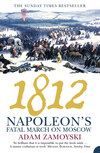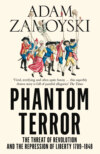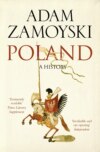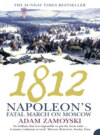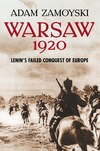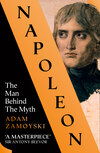Kitabı oku: «1812», sayfa 12
On 16 June he wrote to ‘Quiouquiou’, as the King of Rome’s governess the Comtesse de Montesquiou had been dubbed by her charge, thanking her for informing him that his son’s teething was nearly over. Two days later he heard from Marie-Louise that she was not pregnant, as he had been led to believe by a hint from one of his courtiers. He registered his disappointment and his hope that they would have a chance to put that right in the autumn. He wrote to her daily, in short, scribbled, mis-spelt notes of remarkable banality. ‘I am often on horseback, and it is doing me good,’ he informed her on 19 June.30
The following day, at Gumbinnen, he was reached by a courier from the French embassy in St Petersburg who informed him that Lauriston had been refused an audience with the Tsar and forbidden to travel to Vilna. He and the diplomatic representatives of the various allied states had been instructed to call for their passports, which amounted to a declaration of hostilities.
Napoleon’s propaganda machine, the Bulletins de la Grande Armée, which presented his troops and the world with his version of events, swung into action. The first Bulletin of the campaign detailed his long and painstaking efforts to keep the peace, and reminded the world of the generosity with which he had treated the defeated Russians in 1807, all to no avail. ‘The vanquished have adopted the tone of conquerors,’ the Bulletin announced, ‘they are tempting fate; let destiny then take its course.’ He announced to his soldiers that they would be required to fight soon. ‘I promise and give you my imperial word on it that it will be for the last time, and that you will then be able to return to the bosom of your families.’31
The three corps – Davout’s, Ney’s and Oudinot’s – which were to cross the Niemen first, along with Murat’s cavalry, were massing in the low-lying ground between Wyłkowyszki and Skrawdzen, concealed from view behind the high left bank of the river. The summer heat was intense, made more unbearable for the marching men by the clouds of dust kicked up by the hundreds of thousands of feet and hooves. On 22 June Napoleon set out from Wylkowyszki, passing the marching columns, and reached Skrawdzen at dusk. He had supper in the garden of the parish priest’s house, and asked the priest whether he prayed for him or for Alexander, to which the man replied: ‘For Your Majesty.’ ‘And so you should, as a Pole and as a Catholic,’ replied Napoleon, delighted by the answer.32
At about eleven o’clock he climbed back into his carriage, which drove off in the direction of the Niemen, past large encampments of Davout’s infantry and Murat’s cavalry, which had been instructed to remain out of sight of the river. He did not want the Russians patrolling the other bank to see a single French uniform, and only Polish patrols, which were a familiar sight, were allowed to show themselves.
It was well past midnight when Napoleon’s carriage rolled up to the bivouac of the 6th Polish Lancers. He got out, proceeded to swap his famous hat and overcoat for the cap and coat of a Polish lancer, and made General Haxo of the Engineers, Berthier and Caulaincourt do the same before they mounted horses and set off, escorted by a platoon of lancers. Napoleon rode into a village, from one of whose houses he and Haxo could, unnoticed, survey the city of Kovno on the other side of the river through their telescopes. He then rode up and down the bank, looking for the best place for a crossing. As he was riding along at full gallop a hare started just in front of his horse, causing it to shy abruptly, and Napoleon was thrown. He jumped up immediately and remounted without a word.
Caulaincourt and others of his entourage were astonished: normally Napoleon would have launched into a string of curses directed at his horse, the hare and the terrain, but this time he acted as though nothing had happened. ‘We would do well not to cross the Niemen,’ Berthier said to Caulaincourt. ‘This fall was a bad omen.’ Napoleon himself must have felt the same. ‘The Emperor, who was ordinarily so gay and so full of ardour at times when his troops were executing a major manoeuvre, remained very serious and preoccupied for the rest of the day,’ wrote Caulaincourt.33
Napoleon spent most of that day, 23 June, working in the tent that had been pitched for him. He seemed in sombre mood, and his entourage reflected this by maintaining a silence that many later interpreted as being full of foreboding. But this may have been hindsight. ‘Despite the uncertain future, there was enthusiasm, a great deal of it,’ recalled Colonel Jean Boulart of the artillery of the Guard. ‘The army’s confidence in the genius of the Emperor was such that nobody even dreamed that the campaign could turn out badly.’34
Amongst other things, Napoleon was working on a proclamation to be read out to his troops the following morning:
Soldiers! The Second Polish War has begun. The first ended at Friedland and Tilsit: at Tilsit Russia swore an eternal alliance with France and war on England. She is now violating her promises. She refuses to give an explanation of her strange behaviour unless the French eagles retire beyond the Rhine, thereby leaving our allies at her mercy. Russia is tempting fate! And she will meet her destiny. Does she think that we have become degenerate? Are we no longer the soldiers of Austerlitz? She has forced us into a choice between dishonour and war. There can be no question as to which we choose, so let us advance! Let us cross the Niemen! Let us take the war onto her territory. The Second Polish War will be glorious for French arms, as was the first; but the peace that we will conclude will be a lasting one, and will put an end to that arrogant influence which Russia has been exerting on the affairs of Europe over the past fifty years.35
The proclamation would be greeted with enthusiastic shouts of ‘Vive l’Empereur!’ when it was read out the following morning. Some were left cold, but according to Étienne Labaume, an officer on Prince Eugène’s staff who hated Napoleon, it ‘excited the ardour of our soldiers, always ready to listen to anything that flattered their courage’. ‘His words,’ affirmed Boulart, ‘acted mightily on the imagination of all and awakened all the ambitions.’ ‘It was so fine, that I almost had it by heart,’ recalled an eighteen-year-old military surgeon.36
At six o’clock that evening, Napoleon mounted up and rode over to the riverbank once again. He spent the next six hours reconnoitring and then watching as, at ten o’clock, three companies of the 13th Light Infantry crossed the river silently in boats and fanned out on the other side, while General Jean-Baptiste Eblé and his men began putting in place three pontoon bridges. A patrol of Russian Hussars rode up to the infantrymen, and its officer challenged them with the regulation French ‘Qui vive?’ It was not a particularly dark night, but uniforms were hard to make out. ‘France!’ came the answer. ‘What are you doing here?’ the Russian shouted, again in French. ‘F—k,* we’ll show you!’ they shouted back, letting off a volley of shots which scattered the Hussars.
Napoleon was annoyed by the sound of musketry, as he had hoped to keep the Russians in ignorance of his movements for as long as possible. He rode back to his tent to snatch a couple of hours’ sleep, but at three o’clock in the morning he was back in the saddle, riding a horse named ‘Friedland’ after his last victory over the Russians. By dawn the three bridges were in place, and General Morand’s division, the first of Davout’s corps, was on the other side, ready to cover the crossing of Murat’s cavalry.
Napoleon took up his position on a knoll on which the sappers of the Guard had built him a small bower and a seat out of branches. From here he surveyed the scene, sometimes using the telescope which he held in his right hand, while his left was folded behind his back. There was no trace of the previous day’s preoccupation, and he seemed happy, occasionally humming military marches to himself as he looked down on what one witness termed ‘the most extraordinary, the most grandiose, the most imposing spectacle one could imagine, a sight capable of intoxicating a conqueror’.37
‘The army was in full dress, and from the top of the hill on which the Emperor stood, one could see it file across the three bridges on the Niemen in perfect order,’ recalled Nicolas Louis Planat de la Faye, an aide-de-camp standing close by. The units marched up, one after the other, converging from different directions, on the heights that dominated the left bank of the Niemen. They then descended to cross one of the three bridges over the river, and deployed on the flat right bank. ‘Each regiment marched behind its band, which played fanfares that mingled with cries of “Vive l’Empereur.” As there were no enemy troops to fight, it looked like an immense military parade.’38
‘All the finest men in full dress, all the most beautiful horses of Europe, were brought together there under our eyes, around the central point which we occupied,’ wrote Louis Lejeune, chief of staff to Berthier. ‘The sun shone on the bronze of twelve hundred cannon ready to destroy everything; it shone on the breasts of our superb carabiniers with their gilded helmets and scarlet manes; it shone on gold, on silver, on the tempered steel of helmets, of breastplates, of the weapons of men and officers, and on their rich uniforms.’ The men revelled in their shared sense of power. Some thought of Caesar, some of the crusades. ‘Nobody doubted the success of the enterprise; and at the sight of the means his will had brought together, our hearts beat with joy, pride and vainglory, making us dream of and smile at this forthcoming success,’ according to Lejeune.39
At midday, Napoleon remounted his horse, rode across the river and positioned himself on the Russian bank, where the men crossing the river could clearly see him. ‘Vive l’Empereur!’ they shouted as they passed. Once he was satisfied that the essential elements of his strike force were across, he mounted a fresh horse, named ‘Moscow’, and rode off to Kovno. That evening he took up quarters in a monastery on its outskirts.
‘Vive l’Empereur!’ Captain Fantin des Odoards wrote in his journal at a campfire just outside the city. ‘The Rubicon has been crossed. The shining sword which has been drawn from its scabbard will not be put away in it before some fine pages are added to the glorious annals of the great nation.’40
* Desertion was easy and common, as J. Steininger’s Mémoires d’un vieux deserteur show. He was the son of a deserter from Württemberg, and served, successively, under the following colours, deserting each time: Piedmont, Britain, Prussia, Holland, Austria, Bavaria, Piedmont again, Naples, Corsica, France.
* Diarists of the period invariably display a reticence about spelling out certain words.
8
Vilna
As Napoleon was taking up his quarters in Kovno at the end of an epic day, Alexander drove out to a ball. It was being given for him by his staff officers at the country house of General Bennigsen, at Zakrent, just outside Vilna. The house, which was built on the ruins of a former Jesuit convent, had extensive walled gardens, and as it was a balmy moonlit summer night, dinner was served around the fountains in the illuminated gardens, with only the dancing taking place indoors. During the dinner, Alexander wandered from table to table, pausing to talk to the guests. He was affability itself, captivating all with his usual charm. He then danced with his hostess, Countess Bennigsen, and with Barclay’s wife, before turning his attention to the other ladies. He showed particular interest in some of the young beauties of Vilna society, whom he thrilled by choosing to dance with them. It was already quite late when Balashov sidled up to him and whispered something into his ear, so Alexander’s departure soon afterwards did not cause any surprise, and the party went on.1
There had been a great many parties in the two months since Alexander’s arrival in Vilna in April. And if the rumours of ‘orgies’ were a little far-fetched, the time had indeed been whiled away in the pursuit of pleasure. ‘The fight is about to begin, and we are expecting to be attacked any day,’ Alexander had written to Aleksandr Nikolaevich Galitzine only a week before. ‘We are all prepared and will do our best to carry out our duty. As for the rest, God will decide.’2
In fact, nobody and nothing was prepared. Even the burning issues of command and strategy had not been addressed, and as a result Alexander found himself in a very uncomfortable position when he returned to his quarters in the former archbishop’s palace in the early hours of 25 June. He had just learned that Napoleon had crossed the Niemen, and he had no idea what to do next.
He sent for Shishkov, who was fast asleep in his bed. When the State Secretary arrived, he found the Tsar writing at a table. Alexander informed him of the French invasion and instructed him to compose a proclamation to rally the nation in the face of foreign aggression, the gist of which he dictated himself. One of the few sensible things Alexander had done on his arrival in Vilna was to set up a printing press at headquarters, which would allow him to issue manifestos and leaflets with propaganda to combat the kind of fear and rumour that Napoleon’s reputation generated in the lower ranks.3
A few hours later Alexander held a council of war in order to decide on a course of action. Attack was no longer an option. Bagration’s plan, to strike up into what he believed to be the underbelly of the French armies, was hardly advisable in the absence of firm intelligence of French numbers and positions. A defence of Vilna was difficult to organise, as the Russian forces were scattered over too large an area. The French invasion had taken everyone unawares, and it would be days before they could be readied for battle. There was nothing for it but to withdraw. With Alexander’s approval, Barclay gave orders for a fallback to Shvienchiany, where he hoped to be able to concentrate his forces. He wrote to Bagration, asking him to draw back with his Second Army. ‘Faced with the consideration that the defence of the fatherland is entrusted to us at this critical moment, we must put away all differences and anything that might at other times influence our mutual relations,’ he wrote, in an appeal for cooperation. ‘The voice of our fatherland is calling us to reach an understanding, which is the only guarantor of success. We must unite and defeat the enemy of Russia. The fatherland will bless us for acting in harmony.’4
In an address to his troops, Barclay exhorted them to show bravery and to emulate their comrades who had defeated Charles XII and Frederick the Great, adding that if there were any cowards among them, these should be flushed out at once. In fact, the army was spoiling for a fight. ‘“War!” shouted all the officers, all delighted at the news [of the French invasion], while a warlike spark ran like electricity through the veins of all those present,’ according to Lieutenant Radozhitsky. ‘We thought that we would immediately go out to meet the French, fight them on the border, and chase them back.’ ‘We were all delighted and rubbed our hands,’ another recalled. ‘It never entered anybody’s mind that we might retreat.’5
Barclay also printed leaflets to be strewn in the path of the invaders calling on Frenchmen to go home, and on the German soldiers in Napoleon’s ranks not to fight their Russian brothers, but to join the German Legion being organised in Russia to fight for the liberation of their own country, assuring them that Alexander would grant those who wanted it good land in southern Russia if they defected. Similar leaflets were printed for the Spanish and Portuguese, and for the Italians, who for their part produced an indignant and fiery response demanding that the Russians stand and fight so that they, the Italians, could redeem their honour.6
Alexander’s proclamation was published later that day. It was addressed as much to the world as to the Russian people. It claimed that he had always sought peace, and that it was only the unfriendly actions and then the military preparations of the French that had forced him to mobilise his forces. ‘But even then, cherishing the hope of reconciliation, we remained within the boundaries of our Empire, not disturbing the peace, while being ready to defend ourselves.’ Now that he had been attacked, Alexander could do no more than call on God for assistance and on his soldiers to do their duty. ‘Soldiers! You are defending your faith, your fatherland and your freedom! I am with you, God is against the aggressor!’ It unequivocally equated the eventual defeat of Napoleon with the liberation of Europe by Russia.7
At the same time, Alexander decided on something which some have interpreted as evidence of a sudden loss of nerve, but which was probably only a piece of window-dressing – namely, to accept Napoleon’s proposal to negotiate. His earlier precondition to any talks had been that Napoleon’s troops vacate Prussia and the Grand Duchy of Warsaw; now he merely demanded that Napoleon withdraw beyond the Niemen. That evening he summoned Balashov and handed him a letter he had penned to Napoleon, instructing him to take it to the French headquarters. He told Balashov that he did not expect his mission would stop the war, but at least it would demonstrate to the world that Alexander wanted peace. And as Balashov was taking his leave, the Tsar reminded him to make it clear to Napoleon that he would not negotiate while a single French soldier remained on Russian soil.8
Early next morning, after hearing a report that French cavalry had been spotted approaching the city, Alexander made a hasty and less than dignified exit from Vilna. When news of this spread, a general panic ensued, as staff officers and the many hangers-on struggled to find horses to make their own getaway. Some of the more prescient inhabitants led their horses up the stairs of their houses and concealed them on upper floors. Barclay kept his head and evacuated his troops and headquarters, after destroying the bridge over the river Vilia and setting fire to the military stores which had been so painstakingly accumulated in the city.
These were still burning when, in the early afternoon of Sunday, 28 June, Napoleon rode into Vilna. He had been greeted at the gate by a delegation, but the inhabitants had not managed to prepare a triumphal reception. The Emperor rode through the city to inspect the smouldering remains of the bridge over the Vilia, and then reconnoitred the high ground above the city, before taking up his quarters in the same archepiscopal palace which Alexander had vacated not forty-eight hours before.
‘The Emperor’s manoeuvres will prevent this from being a particularly bloody campaign,’ Marshal Davout reported to his wife the following day. ‘We have taken Wilna without a battle and forced the Russians to evacuate the whole of Poland: such a beginning to the campaign is equivalent to a great victory.’9
His enthusiasm was not shared by his imperial master. Napoleon was annoyed and somewhat mystified. He was annoyed that he had not managed to engage with the Russians, and mystified because he could not make out what they were up to. They had deployed a substantial army to face him, and appeared to be preparing to defend Vilna. But the moment he marched out to engage it they had decamped, abandoning an important city and all their stores. Their behaviour made no sense, and he could not be sure that they were not setting some kind of trap. He instructed all his corps commanders to proceed with the utmost caution and to expect a counterattack at any moment.
In the north, Macdonald was making for Riga more or less unopposed, and Oudinot was in hot pursuit of Wittgenstein, against whom he had scored a minor success. Ney and Murat were on the heels of Barclay. And to the south Jérôme was advancing with his Westphalians, Prince Eugène’s Italians and Poniatowski’s Poles. Napoleon himself, with the Guard and part of Davout’s corps, remained in Vilna, partly in order to supervise the rebuilding of bridges, the erection of fortifications and the construction of bread ovens, and partly out of the necessity to deal with alarming new problems.
The troops had been on the move for days, struggling on the bad roads to reach their positions. Their provision wagons were left far behind, and when they stopped for the night they often did not have the time or the energy to cook the rice they had in their knapsacks, let alone turn their bags of flour into bread. The countryside between the Niemen and Vilna was sparsely populated, and there was no food to be had from the locals, who had already been bled dry by the Russian forces over the past months. It was swelteringly hot, as hot as Spain in summer according to some of those who had campaigned there. The marching columns kicked up clouds of fine dust, and the scarcity of habitations meant there were no wells at which the men could slake their parched throats. The horses also suffered from the heat and the lack of water, as well as from being fed on unripe barley and oats.
After four days of this, just as the exhausted men were about to bed down for the night – which meant lying down on the ground wherever they could find a place – a primeval storm burst upon the area to the south and west of Vilna. A torrent of freezing rain poured down on them all through the night, and they soon found themselves lying in pools of icy water. ‘By daybreak, the storm had passed, but it was still raining,’ recorded Colonel Boulart of the artillery of the Guard, who could hardly believe his eyes as he emerged from under the gun carriage where he had taken shelter. ‘What a sight offered itself to my eyes! A quarter of my horses were lying on the ground, some dead or dying, others shivering. I quickly ordered as many as possible to be harnessed, hoping to get my wagons away, and to set this sad crew in motion so that the poor creatures might generate some of the heat they so badly needed, and thereby prevent a good number of them dying.’10
Conditions were indescribable as the various units struggled to get to somewhere they might find shelter and food for themselves and their beasts. The roads were littered with the carcases of horses and the corpses of men, with abandoned wagons and gun carriages. ‘One could see in front of every caisson two or three of these creatures in full harness, their traces on the swingletree, fighting against death or already lying lifeless,’ recalled Lieutenant Sauvage of the artillery. ‘The gunners and the soldiers of the train stood by in mournful silence, their eyes filled with tears, trying to avert their gaze from this afflicting scene.’ Adjutant Lecoq of the Grenadiers à Cheval, a veteran of the Italian and Prussian campaigns, watched in horror as an artillery unit struggled through the storm. ‘The horses had water up to their bellies, on a shifting sandy road,’ he recalled. ‘As they tried to pull they lost their footing, fell and drowned.’11
The number of men who perished during the downpour was probably quite small, although there were rumours of up to three grenadiers being struck by lightning. But losses among the horses were horrific. Most of the artillery units lost 25 per cent of theirs that night, and the situation in the cavalry was not much better. Abraham Rosselet, an officer in the 1st Swiss Regiment, estimated that Oudinot’s corps, to which he belonged, lost upwards of 1500 cavalry and artillery horses. Colonel Griois, commanding the divisional artillery of Grouchy’s cavalry corps, claimed that he lost 25 per cent of his. It is generally estimated that the combat units lost over 10,000 in a period of less than twenty-four hours. This is a conservative figure, and it does not take into account the losses of the supply columns, which according to one commissaire were probably as high as 40,000.12
The psychological damage left by the storm was hardly less significant. As the men trudged on through the quagmire that had replaced the sandy roads, they could see dead and dying men and beasts by the roadside, and rumours of grenadiers of the Old Guard having been struck by lightning passed from rank to rank. The young Anatole de Montesquiou-Fezensac joked with Baron Fain that if they had been Greeks or Romans in ancient times they would undoubtedly have turned about and gone home after such an omen. Others took it more seriously, the Italians in particular. ‘So many disasters were a sad augury for the future,’ wrote Eugène Labaume. ‘Everyone began to take fearful note of them, and if, following the example of the ancients, we had shown more respect for the warnings of heaven, the whole army would have been saved: but, the sun having reappeared over the horizon, our apprehensions were dissipated along with the clouds.’13
Napoleon’s apprehensions were not dissipated so easily. Soon after his arrival in Vilna he became aware of the appalling losses his army had sustained, and, what was worse, of the fact that his carefully-worked-out plans for supplying it had come to nothing. The heavy wagons drawn by oxen had sunk into the sand of the Lithuanian roads before being waterlogged by the storm. The supplies despatched from Danzig through Königsberg by river and canal had had no trouble in reaching Kovno, but the river Vilia was too shallow in places for the barges, and they could not be brought up until some dredging was carried out or their loads were transferred to shallower boats.
The French found no supplies to speak of in Vilna, and now, thanks to the storm, there were no horses with which to bring any in. ‘We are losing so many horses in this country that it will take all the resources of France and Germany to keep the present effectives of the regiments mounted,’ Napoleon wrote to his Minister of War, General Clarke. And while no supplies were finding their way to Vilna, sick stragglers were limping or dragging themselves in at an alarming rate. There were soon 30,000 of them crowding the hospitals rapidly improvised to receive them.14
The only bright spot for Napoleon on an otherwise bleak landscape came when he learned that his rapid advance had driven a wedge between Barclay and Bagration’s Second Army; if he exploited this breach, he would be able to annihilate the latter. He sent Davout with his two remaining divisions (two had been detached to support Murat) and Grouchy’s cavalry corps in a south-westerly direction to cut off Bagration’s retreat, and despatched orders to Jérôme, Eugène and the commanders of other units in the area instructing them to encircle Bagration. But getting orders through at all, let alone with the requisite speed, was another unexpected problem.
On the morning of 1 July one of the duty aides-de-camp, Boniface de Castellane, was summoned to the Emperor’s quarters. He found Napoleon in his dressing gown, a red and yellow kerchief on his head. The Emperor showed him a point on the map where he would find General Nansouty with his cavalry corps. ‘I am manoeuvring to cut them off, I have 30,000 within my grasp, make haste,’ he said to Castellane as he handed him sealed orders to deliver to Nansouty.15 Napoleon needed a victory to throw into the balance against the losses he had borne, and catching Bagration became a priority.
A few hours later Napoleon summoned Balashov, who had presented himself to the French advance posts and been brought to headquarters bearing Alexander’s letter. He was now ushered into the very same room in the former archbishop’s palace in which Alexander had delivered the letter to him six days earlier. Napoleon was in a filthy mood. ‘Alexander is making fun of me,’ he thundered in response to the letter. ‘Does he really think I have come all the way to Wilna to negotiate commercial treaties?’ He had come to deal once and for all with the barbarians of the north. ‘They must be thrown back into their icy wastes, so that they do not come and meddle in the affairs of civilised Europe for the next twenty-five years at least.’16
Balashov was hardly allowed to get a word in as Napoleon paced the room, giving voice to his thoughts and feelings, venting his disappointment and the anxiety that was beginning to eat away at him. The monologue veered from whining reproach to squalls of anger as disappointment and fury struggled against each other for expression. He complained that it was all Alexander’s fault, that the war had been started by Russia, by her demands that he evacuate Prussia and by Kurakin requesting his passport. He professed his esteem and love for Alexander, and reproached him for surrounding himself with adventurers and turncoats such as Armfeld, Stein and the murderer Bennigsen. He could not understand why they were fighting instead of talking as they had at Tilsit and Erfürt. ‘I am already in Wilna, and I still don’t know what we are fighting over,’ he said.17
The wheedling would turn to bluster, with Napoleon defying the Russian generals to fight him, accusing them of ineptitude and cowardice, and threatening to unleash the army of a restored Kingdom of Poland at them. He shouted, stamped his foot and, when a small window which he had just closed blew open again, tore it off its hinges and hurled it into the courtyard outside. The detailed accounts of the interview by Balashov and Caulaincourt make embarrassing reading.
He was no more polite or dignified at dinner that evening, to which he sat down with Balashov, Berthier, Bessières and Caulaincourt. He fumed and bullied, declaring that Alexander would regret his stubbornness and that Russia was finished as a great power. With his customary wishful thinking, he warned that the Swedes and the Turks would not resist the opportunity to take their revenge for past defeats, and would pounce on Russia as soon as he advanced further. But in the letter addressed to Alexander that he handed to Balashov, Napoleon professed continuing friendship, peaceful intentions and a desire to talk, without however acceding to Alexander’s precondition of a withdrawal behind the Niemen.18
Ücretsiz ön izlemeyi tamamladınız.
